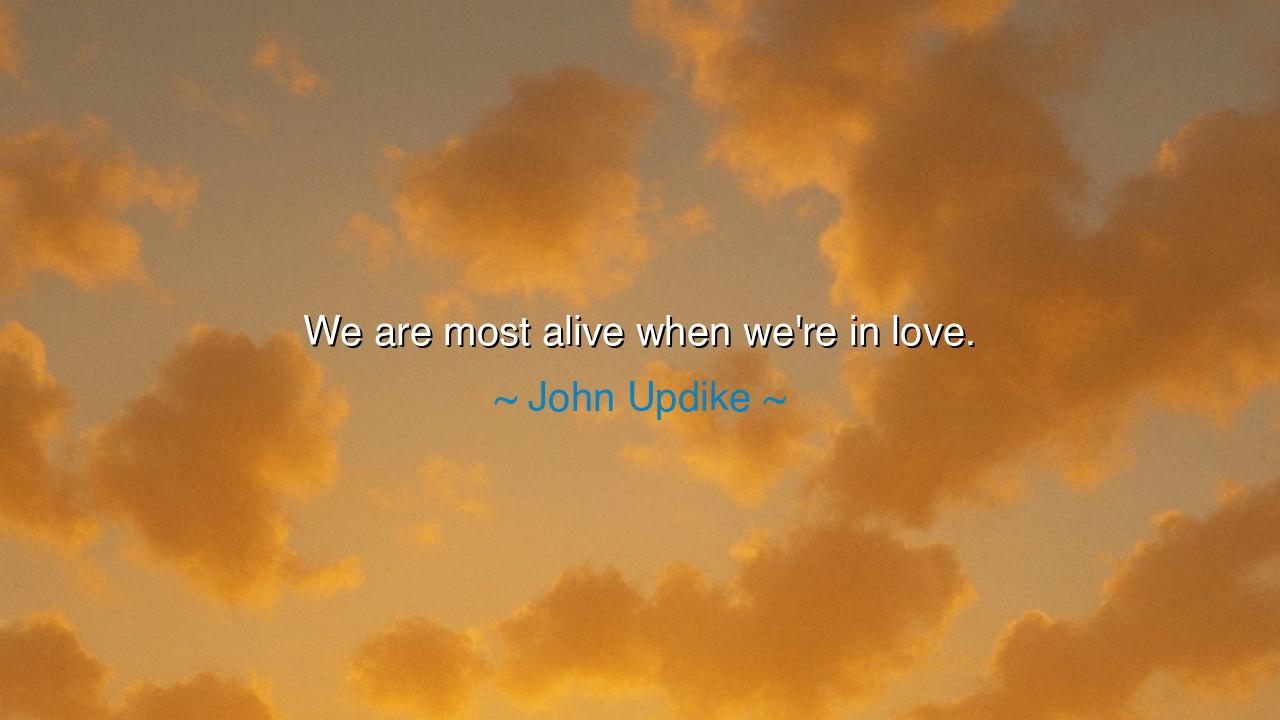
We are most alive when we're in love.






In the quiet depth of his insight, the American writer John Updike once declared: “We are most alive when we’re in love.” These words, though simple, speak with the eternal voice of truth — for love is not merely an emotion, but the fire that awakens the soul from its slumber. To be in love, says Updike, is to dwell in a heightened state of being, where every breath, every color, every sound seems charged with meaning. Love opens the senses, expands the spirit, and allows the heart to feel the pulse of life itself. In that sacred state, one becomes more than a witness to existence — one becomes a participant in its divine rhythm.
John Updike, who spent his life exploring the mysteries of human desire, faith, and longing, understood that love is the force that gives depth to our days. His words arose not from fantasy, but from keen observation of life’s intimate truths. Through his novels and essays, he saw how people — flawed, searching, fragile — came most fully alive when touched by love, whether it was romantic, spiritual, or creative. Love, he believed, is the great awakener. It stirs us from the routine of survival and reminds us that we are not machines or shadows, but living souls made to feel, to give, to connect. In the presence of love, time slows, the ordinary becomes radiant, and the heart learns what it truly means to live.
To say that we are most alive when we’re in love is to recognize that love restores our connection to the world. When one loves deeply — a person, a dream, or even a cause — the boundaries between self and life dissolve. The heart beats not just for itself, but for something greater. The poet Rumi once wrote, “Love is the bridge between you and everything.” Updike’s quote is that same bridge in modern form: a reminder that love is the lifeblood that flows between all things. Without it, life becomes dull and mechanical; with it, existence unfolds in color, sound, and light. Love is the oxygen of the soul.
Consider the story of Mahatma Gandhi, whose love was not confined to one person but extended to all humanity. His devotion to truth and compassion made him alive in the deepest sense — not merely breathing, but blazing. It was love that gave him strength to endure imprisonment, hunger, and ridicule. His life became a testament to Updike’s truth: that to love is to tap into the inexhaustible source of vitality that dwells within all hearts. For even when his body was frail, his spirit was boundless, nourished by the love he bore for the freedom and dignity of others.
Yet, this aliveness that love brings is not without peril. To open oneself to love is to become vulnerable — to joy and to sorrow alike. Love makes us feel deeply, and that includes the ache of loss, the sting of jealousy, the fear of impermanence. But even in pain, the one who loves truly lives more fully than the one who hides behind indifference. As the ancients taught, the price of a numb heart is a lifeless existence. Better, they said, to burn brightly for a short while than to remain forever cold. For love, even when it wounds, leaves the heart expanded and alive to all the wonders of the human journey.
Love also takes many forms — the love between two souls, the love of a parent for a child, the love of a creator for their craft, the love of one who seeks the divine. In each of these, life gains purpose and texture. When an artist paints with passion, when a scientist searches for truth with wonder, when a mother holds her child, when friends share laughter — they are all alive in love. This vitality is not about romance alone; it is about being fully engaged, fully present, fully aware that life, in its fleetingness, is a gift to be cherished through love.
Therefore, the lesson that Updike offers is both ancient and eternal: Seek what makes your heart come alive, and give it your love. Do not live half-asleep, moving through days untouched by passion or wonder. Love — even when it






AAdministratorAdministrator
Welcome, honored guests. Please leave a comment, we will respond soon